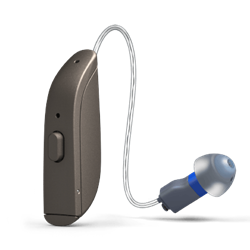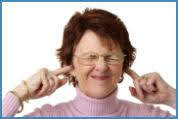Hearing aids aren't about getting old, they're the key to staying young!

Enjoy stress-free listening with the new ReSound ONE hearing aid. Effortless hearing, stylish, discrete & packed full of features. We love this hearing aid.
Read Our ReviewHow Loud Is Too Loud: Decibel levels of common sounds
Sound Advice
 Decibels are in essence a measure of volume
Decibels are in essence a measure of volume
The volume or intensity of sound is measured in units called decibels (dB), generally on a scale from zero to 140 (any higher than 140 and you are in trouble immediately). The higher the number in decibels, the louder the noise. The louder the noise, the greater the risk of hearing loss. Hearing loss can occur with regular exposure to noise levels of 110 decibels or more for periods longer than one minute. Not only can noise cause hearing loss, it can also cause tinnitus.
So How loud is too loud?
The risk of sound damaging your hearing is in fact based on how loud and for how long. Continued exposure to noise at or above 80-85dB over time can cause hearing loss, however, the exposure length in that case would be hours. Generally speaking, if you have ringing in your ear or your hearing seems dull after you have been exposed to sound (including loud music) or noise you have exposed yourself too much. However, it is important for me to point out that you may still be damaging your hearing even if you don’t have these symptoms.
If loud music ever feels way too loud or causes pain in your ears, leave the room or turn it down immediately. Without noise measuring equipment it is impossible to tell what noise level you are being exposed to. So, a handy rule of thumb is that if you can’t talk to someone two metres away without shouting, the noise level could be damaging. Speaking of noise measuring equipment, you can download plenty of sound measuring apps for your Android or Apple smartphone. Download one and use it to understand the sound around you.
Intensities of common sounds in decibels and time exposure limits
| Sounds | Intensities | Permissible exposure time |
| City Traffic, inside the car | 85 dB | 8 hours |
| Bulldozer | 88 dB | 4 hours |
| Jazz Concert | 91 dB | 2 hours |
| Power Mower | 94 dB | 1 hour |
| Nightclub | 97 dB | 30 minutes |
| Ambulance Siren, inside driver window down | 100 dB | 15 minutes |
| Rock Concert, Leaf Blower | 115 dB | 30 seconds |
Go To The Next Page For An In-Depth Table Of Common Sounds & Their Decibel Levels
Long Term Exposure To Noise Over 85 dB Can Cause Hearing Loss
No more than 15 minutes of unprotected exposure to 100 decibels is recommended. Long-term exposure to 80-85 decibels or over can cause hearing loss. Protect your hearing, because once the damage is done, it is done. It is important that you realise that the noise we speak of is any sound, it isn't just what you think is noise. Music presented at the right dB level will do just as much damage to your hearing. Once you go past 85dB, you are on the clock.
Don't forget, sound is sound, at the right volume level that music you love will damage your hearing
Here is a short list of common noises and their decibel levels:
- Aircraft at take-off (180)
- Fireworks (140)
- Snowmobile (120)
- Chain saw (110)
- Amplified music (110)
- Lawn mower (90)
- Noisy office (90)
- Vacuum cleaner (80)
- City traffic (80)
- Normal conversation (60)
- Refrigerator humming (40)
- Whisper (20)
- Leaves rustling (10)
- Calm breathing (10)
Protect Your Hearing with Custom Hearing Protection
Arrange a consultation with a trusted Independent hearing healthcare professional in your area
We like giving good advice, we also like the idea that we can somehow get people to protect their hearing. We also give advice on hearing devices and discuss hearing aid technology. If you are interested in hearing Aids, their types and technologies, take a look at our consumer hearing aid advice guide. It details types, advantages and disadvantages, technology levels and features of hearing instruments in clear and easy to understand language.
If you like what you see, share it so others can benefit
Rate this article
(Rated 3 stars by 894 people)





Looking For Hearing Aids or A Hearing Test?
We can arrange a consultation with a trusted Independent hearing healthcare professional in your area


